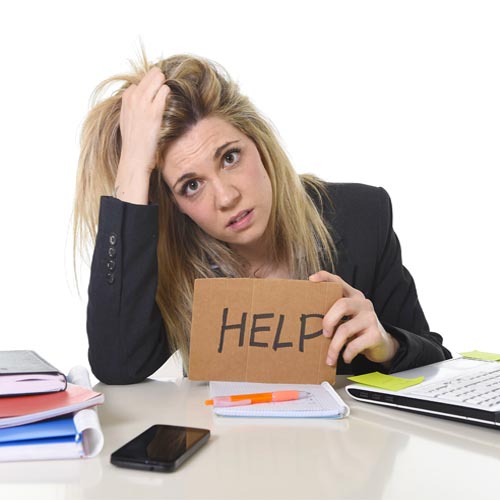Overwhelm arrived a few months early this year. Usually, I write a post about how to manage feeling overwhelmed near the end of the calendar year because that’s when I have loose ends everywhere, especially in recordkeeping, taxes, and finances. But it’s only October and everything has piled up and I don’t know where I’ll find the time and energy to do all I want to do to get ready for the beginning of a new year.
Overwhelm is Global as well as Personal
Many people I know are living with an unbearable sense of being overwhelmed these days. Overwhelm (yes, it is a noun) is the sense of being engulfed by a sense of desperation that things are falling apart and out of your control. Overwhelm is usually accompanied by the pressure to handle everything immediately and perfectly. The more overwhelmed you are, the more things you put on your list, as if having a list restores your capability and control. The truth is, overwhelm immobilizes you, whether you have a list in front of you or not. In fact, for some of us, the list itself can trigger the paralysis that partners with overwhelm.
Overwhelm shows up when you’re
- Feeling that you are so behind, there’s no way to catch up;
- Looking at piles of notes and half-written blogs or articles, and you
 can’t decide what to keep and what to toss;
can’t decide what to keep and what to toss; - Losing your ability to manage the cumulative clutter on your desk;
- Believing that every item on your list has equal urgency and importance; and
- Pressuring yourself to do everything perfectly.
Sometimes for me, overwhelm comes abruptly and unexpectedly. Then, later in the day, I will be speaking with someone on the phone or taking a walk with a friend, and I mention being caught off-guard by feelings of helplessness and confusion. Most often, the other person is experiencing something similar, and they are relieved that I spoke about my experience of overwhelm. And as we talk, we realize that nothing in our personal lives has changed much. However, we now understand that we have been touched by something larger than ourselves, something that is impacting our individual worlds.
World Events Increase Our Personal Sense of Overwhelm
Even if you are one of those super organized and logical persons, the outside world can come crashing down. This year, I’ve had my emails hacked, my computer screen go blank for two days and then mysteriously return to normal, and my bank (a large international bank with a long history of being in business) shut out most of its customers and me for 48 hours with no access to ATMs or online bill-paying tools. These are a few examples of how the world that I usually count on kept breaking down over the past year.
All around us, we observe that the world is in chaos. We feel overwhelmed by violence, corruption, and deceit, both nationally and globally. When we live in an unpredictable and possibly dangerous situation, many people shut out the outside world. Instead, they stay home and binge on Netflix, hide away at the gym, or finally read the novels that piled up on the nightstand over the years.
What friends, colleagues, and clients tell me is that:
- They feel powerless to do anything to help solve these larger problems.
- They are heartbroken over the violence and cruelty of world leaders toward their own people.
- Their lives are so busy and stressful that even if they knew what to do, they can’t find the time or money to devote to anything outside of their own families.
We suffer because we are distracted, worried, and confused about what to do. We end up either sitting on the edge of our seats expecting the worse or drawing the curtains and locking the doors to wait it out, hoping the overwhelm—the anxiety, the stress, the powerlessness—will pass.
We Can Surmount Overwhelm
Even when we are can’t contend with the problems outside our immediate surroundings, we can find antidotes to get us out of overwhelm in our daily lives and restore our peace of mind, concentration, and enthusiasm. Here are twelve strategies for getting yourself out of overwhelm. Pick only one! (Don’t let getting out of overwhelm create more stress.)
- First, recognize and acknowledge that you are feeling overwhelmed. Don’t push through the feeling: give yourself room to accept that you’re feeling overwhelmed right this minute.
- Get rid of the post-its and scraps of paper and put all your to-do items on one list.
- Prioritize. I love using the Eisenhower Matrix to help me prioritize my list. The matrix employs two criteria to rate the items on your list: urgency and importance. Here’s an explanation of how it works.
- Do less but do something.
- Don’t multi-task. Turn off the phone and the email. Focus.
- Write out your biggest goal. Then chunk it down into small, measurable steps. Take the first step on one goal.
- Know your peak energy times and schedule the work that requires your best concentration and creativity for those times.
- Schedule breaks—a walk, a coffee break with a friend—and feel renewed.
- Learn to delegate: are you the only person who can do this task? Are you the best person for this task? If not, then delegate.
- Drop perfectionism. Some things will be done as well as possible, and other things will just get done.
- Identify your ideal times for working, writing, doing your finances, and relaxing. Then put the times in your calendar to minimize multi-tasking, forgetting, and procrastinating.
- Express your gratitude for everything in your life. Clean air, a comfortable bed, and three meals a day are luxuries for many people, so be grateful.
Let’s change the O word from overwhelm to a word that can free us, energize us, and help us show kindness to everyone we meet. Let’s start with these alternative O-words:
-
-
-
- Overjoyed
- Opportunity
- Optimistic
- Originality
- Open-hearted
-
-
What’s your favorite O-word? What does that word mean to you? Use it in a sentence and share your inspiration with all of us in the Comments section. Thanks!









Opportunity is my favorite O word. I’m always looking for what opportunity each situation brings. It is a double edged sword however. One can’t afford, time wise or energy wise, to take advantage of every opportunity. That one way that I get myself into overwhelm.
Hi Marsha,
Very inspirational blog… I especially liked your description of the overwhelming world. Clear instructions! Thank you. have a great week!